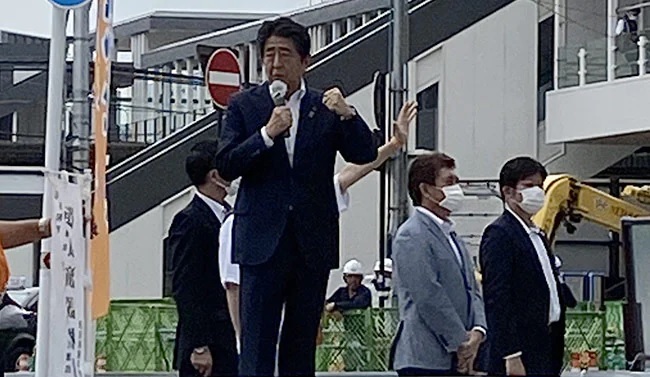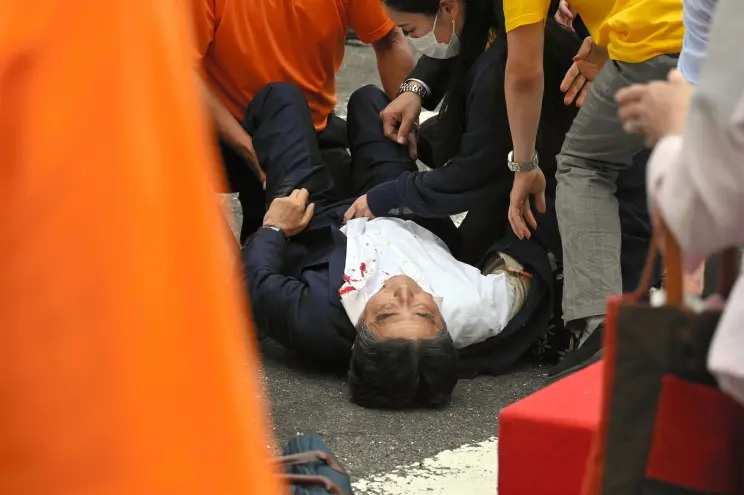Shinzo Abe, Ex-Japanese Prime Minister, Dies After Being Shot During Campaign

According to a report from Japan, Shinzo Abe, the country’s former prime minister, passed away on Friday at the age of 67 after being shot during a campaign address in western Japan. In a nation with some of the strongest gun control regulations worldwide, it was a startling attack.
Minutes after beginning his speech on Friday in Nara, western Japan, Abe was shot from behind. According to Makoto Morimoto of the local fire service, Abe was shot and went into cardiac and pulmonary arrest. According to Morimoto, as he was being evacuated to a hospital, his heart stopped. At the hospital, he was subsequently declared dead.
Chief Cabinet Secretary Hirokazu Matsuno informed reporters that police had detained a male suspect at the scene of the shooting in Nara. Tetsuya Yamagami, 41, was detained on suspicion of attempting to kill someone, according to NHK, Japan’s official broadcaster.
Video footage above can be disturbing for some viewers.
According to Ministry of Defense authorities, Yamagami served in the Maritime Self-Defense Force for three years, from about 2003 to 2005, according to NHK. According to NHK, citing police sources, the suspect stated in a police statement that he was unhappy with Abe and intended to murder him.
According to Kishida, the shooting was “barbaric and spiteful, and it cannot be permitted.” “We’ll exert every effort. I want to denounce this behaviour in the strongest terms possible.”

Abe was shown bleeding and grasping his chest in footage that various Japanese media showed, lying on the ground with many security personnel rushing to help him.
Gunshots were reportedly heard by witnesses during the alleged incident in Nara. In his address during the campaign for the Sunday election for the upper chamber of parliament, Abe was standing.
The harshest firearms laws in the world are found in Japan. Prospective owners must go through official training, written, mental, and drug examinations, as well as a thorough background investigation.
Abe became prime minister of Japan in December 2012, and after a persistent condition flared up again in August 2020, he announced his resignation.
Read More: What Happened To The 40 Miles Long Russian Military Convoy Outside Kyiv?
Abe promised to revive the country and lift its economy out of its deflationary rut with his “Abenomics” formula, which includes fiscal stimulus, monetary easing, and structural reforms, as he ran for government a second time in 2012.
Abe’s successful quest to host the 2020 Tokyo Olympics was one of his biggest domestic achievements, but it was marred by the coronavirus epidemic that led to the Olympics’ delay to 2021.
His zeal to normalise Japan’s defensive posture infuriated many Japanese, while his ultra-nationalism infuriated the Koreas and China. Due to a lack of popular support, Abe was unable to officially rewrite the pacifist constitution, which was the country’s founding document.
Abe continued to hold significant political sway among his Liberal Democratic Party even after his resignation. When he was shot on Friday, he was running for the party.
According to many media reports, Secretary of State Antony Blinken expressed his “profound sadness and serious worry” about the shooting while also stating that he was unaware of Abe’s health.
Donald Trump, a former president, called it “very horrible news.” On his social media platform Truth Social, he said that Abe “was a genuine friend of mine and, more significantly, of America. The great people of Japan, who adored and appreciated him so much, have been dealt a devastating blow by this. We are all sending up prayers for Shinzo and his lovely family!”
The American ambassador to Japan, Rahm Emanuel, expressed that “we are all grieved and appalled” by the shooting.
“Abe-san has been an outstanding leader of Japan and unwavering ally of the U.S. The U.S. Government and American people are praying for the well-being of Abe-san, his family, & people of Japan,” he wrote in a tweet.
